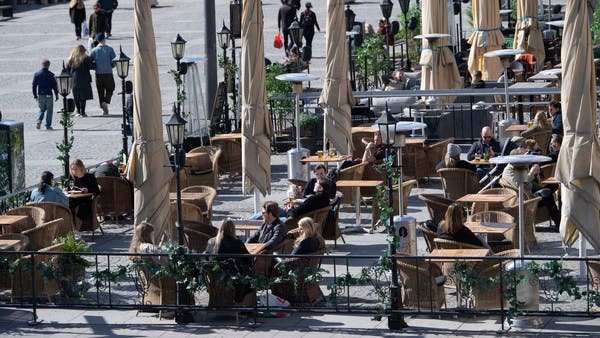Coronavirus: Sweden to achieve partial ‘herd immunity’ in weeks

People sit at a cafe in central Stockholm amid the coronavirus pandemic. (File photo: AFP)
The Swedish model of continuing life as normal despite coronavirus has led to it achieving “herd immunity” in parts of the country, with others to follow within weeks, said the country’s infectious diseases chief according to the British newspaper The Daily Telegraph on Saturday.
Sweden has taken a dramatically different approach to combating the coronavirus pandemic, adopting a business-as-usual strategy without imposing any social distancing measures or curfews. Unlike most other countries, schools and borders remain open as well as “non-essential” businesses including restaurants and entertainment hot spots.
While Swedish authorities have been criticized for their approach, they are now saying that it is beginning to work by achieving “herd immunity” – when a majority of the population is immune to a disease, limiting its spread. As no vaccine yet exists for coronavirus, countries can only achieve herd immunity to COVID-19 by a majority of their citizens contracting and surviving the virus, therefore becoming immune to contracting and spreading it a second time, although this has not been definitively proven as of yet.
“According to our modelers, we are starting to see so many immune people in the population in Stockholm that it is starting to have an effect on the spread of the infection,” said Anders Tegnell, the state epidemiologist who has been the figurehead of Sweden’s strategy, on Norwegian TV as reported by The Telegraph.
Tegnell explained that the Stockholm, the center of Sweden’s coronavirus outbreak, could achieve herd immunity as early as next month.
The models suggest the city will achieve herd immunity “some time in May … These are mathematical models, they’re only as good as the data we put into them. We will see if they are right,” he said.
It is still unclear whether catching coronavirus does make people immune to catching it again or spreading it.
The consequences: Protected economy, higher death rate?
The “herd immunity” strategy has been widely criticized in Sweden and elsewhere as putting people’s lives at risks by allowing them to catch the virus.
Having initially considered the strategy, the UK government did a U-turn to impose lockdowns after scientists realized the death toll would number tens of thousands.
On the other hand, proponents of the herd immunity strategy have argued that lockdowns are damaging economies and causing a potentially devastating recession, which could kill more people in the long-term.
However, data that is due to be released by Swedish lender Swedbank on Monday shows that despite Sweden not imposing a lockdown, there was a “sharp drop in activity in the first two weeks of April,” according to the bank’s chief economist Andreas Wallström in The Telegraph.
Sweden’s death rate is also higher than its neighbors, likely due to its herd immunity strategy.
“In Finland on Thursday the cumulative number was 13 dead per million inhabitants, in Sweden it was 130 per million inhabitants. Finland: 75 dead, Norway: 152 dead, Sweden: 1,333 dead,” virologist and public critic of the strategy Lena Einhorn told the Sunday Telegraph.
“And yet Anders Tegnell is saying ‘we are feeling very hopeful.’ What are they hopeful about?” she added.
Sweden has reported nearly 14,000 coronavirus infections, higher than its Nordic neighbors, but still significantly lower than the worst hit countries in Europe, including Italy, Spain, France, and the UK.
Source:english.alarabiya.net/